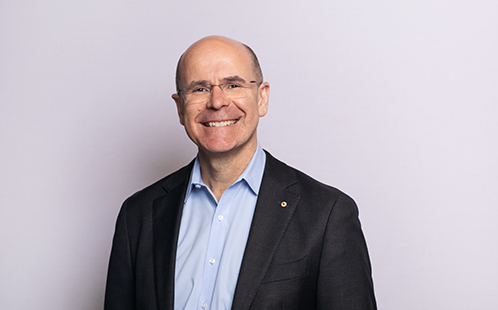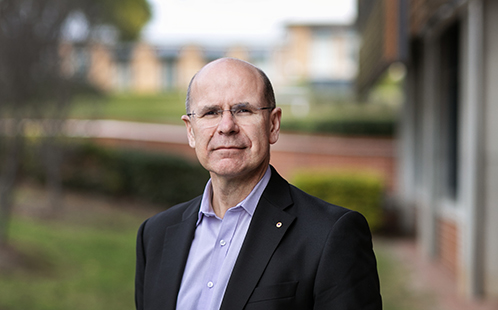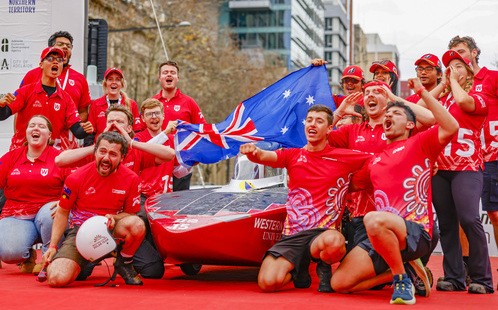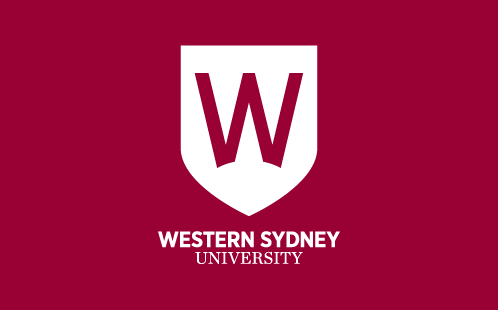ABC 702 Mornings: Vice-Chancellor George Williams talks about proposed international student caps

The following is a transcript of an interview that appeared on 702 ABC Mornings program between reporter, Sarah Macdonald and Vice-Chancellor and President, Distinguished Professor George Williams AO on Tuesday, 27 August 2024.
Sarah Macdonald:
Look, one way that immigration will be reduced in the future is by imposing international student caps at our universities.
Now, this is coming, and universities in Sydney are worried about it.
They appeared at a Senate inquiry into this yesterday and the Vice-Chancellor of Western Sydney University, George Williams, was there.
And Professor George Williams joins me now.
Good morning. Thanks for your time today.
Professor George Williams:
Pleasure.
Sarah Macdonald:
So the Vice-Chancellor of Sydney University, Mark Scott, said half of Sydney University students are overseas students. What's the proportion at Western Sydney University?
Professor George Williams:
So it's about 19 .9 percent, so it's much lower than the 50 percent. So it's about 9 ,000 students at the moment. We have enrolled here from many countries.
In our case, Nepal is actually the biggest country, but there's many others as well, China, Vietnam, India and the like.
It's quite a spread. And of those, one of the largest cohorts is actually nurses.
So we take in lots and lots of nurses from other countries, and many of those end up staying to work in Western Sydney because we've got such a critical shortage of nurses here, about 10,000 we're short, that many of those actually end up meeting our health needs here in Western Sydney.
Sarah Macdonald:
Yes, I saw that. You said that in your opening statement. So how many stay in the area and go and work and provide the health care the people in Western Sydney need?
Professor George Williams:
Yes, of those, we've got most of the 1,350 international students who study nursing stay here in Western Sydney, and that's because there's a special pathway that enables them to stay and work in our community.
But that's a federal government decision. There's other areas where, of course, we don't need those skills and the students will go back. And mostly, it's well above 80 percent across the board international students who go back to their home country.
But not just nursing, but there's other key skills within the community where we just don't have the domestic demand to fill things like critical health shortages. And for that, we need international students studying here and staying.
Sarah Macdonald:
So you've said it's 19 percent of your university. What are you most worried about if there's a cap because you won't be affected nearly as much as, say, Sydney University or UNSW?
Professor George Williams:
No, well, it depends on how you have the cap, of course. If it's set at 50 percent, it wouldn't affect us. On the other hand, if it's to fix us at a level we were today or a few years ago, that would affect us.
And a big part of the problem is we just don't know. It's really unclear how this is going to be worked out. And when it comes to our university, we need to grow.
Western Sydney is growing, gangbusters, of course, with an airport coming in, the Bradfield City complex, big companies and the like. So ours is a growth trajectory because we need international students to support that.
And in our case, it's not an issue of housing at all. So much of this is driven by fears that the private housing market might be heated up by international students, but in our case, we've got a bed for every single one. In fact, 20 percent has...
Sarah Macdonald:
You give a bed to every single international student, so it's not just in housing at the university, you've also got them with families, I understand.
Professor George Williams:
That's right. In fact, many of our students actually want to stay with a local family, and you can imagine you've got a daughter coming from Nepal, and rather than going into a college, that daughter might stay with a local Sydney family.
Maybe there's a couple of daughters in the family, it makes people feel safe, it introduces you to Western Sydney culture, and of course, it may be a local Nepalese family, so it's culturally the same as well, and that daughter, the international student who comes in, might provide $300 or $400 a week to the local family, and given how much people are struggling at the moment with cost of living pressures, that's vital.
So many families are taking advantage of this because they want international students to stay with them and support them financially.
Sarah Macdonald:
Do you have any idea, George Williams, about how a cap would work? Have you had discussions with Jason Clare, the Federal Education Minister, because it doesn't seem quite clear yet how it is going to work?
Professor George Williams:
And that, again, is a large part of the problem, and we're hoping, of course, this will happen in a sensible way that, in our case, reflects the fact there isn't a housing problem, and Western Sydney needs things like nurses to fill skills gaps, but it's all happening so quickly, and we had the hearing, as you said yesterday, into the bill, that hasn't even been passed yet, and so, but we're coming towards the end of the year, we're hurtling there quite quickly.
Sarah Macdonald:
Well, the bill allows him to put the cap on, and we don't quite know how that cap would work. I mean, what do you think about Sydney University, for instance, having half its students, 50 percent from overseas? What are you comfortable with?
Professor George Williams:
I think it depends upon the university, to be frank, and if you look at many of the world's best universities, if you want to go to Harvard, Oxford, or a range of others, that's not unusual.
If you want to go to a university that's really a global university...
Sarah Macdonald:
Does Harvard have 50 percent overseas students?
Professor George Williams:
It probably is about that. I haven't looked at the figures there, but it's pretty common, and if you for example, go into a Harvard course, as I did on one occasion, almost all were international, and that's the idea, that you go there and mix with the best from around the world, but that's a different path for the University of Sydney.
I mean, we're not going that path. We’re focused on Western Sydney, and so, for us, 50 percent would be wrong for us. We're not aspiring to anything like that.
It's more, what does our community need? What's the right number? And hopefully, getting a cap that reflects the needs of our students and community.
Sarah Macdonald:
Someone's texted me saying Australia has more international students than the entire United States. Is that true?
Professor George Williams:
No, I don't think that's right, but we do have many, and we are, I think, arguably the most competitive higher education sector in the world, given our size. But the US is much bigger, because, of course, there are many more universities.
It's a big magnet to study there. And in our case, our university's been opened up to competition. Government funding's declined enormously, and universities, if they want to support themselves, have turned to international students.
And in our case, international students, it's not just skills, it's about supporting our equity programs and making sure that the funding that they bring in covers the basics that our domestic students need to stay and study.
Sarah Macdonald:
David says having a disproportionate number of foreign students who struggle with English does bring down the quality of tertiary education across the board.
Professor George Williams:
I think that absolutely can be true. And if you take that issue about English, sometimes it can be the case that the English standards are too low.
And if that's the case, then, yes, you have a problem with the standard of teaching in the course, but if you set it at the right level and you have a mix of students, as we've got, we've got no country with more than 20 percent representation in our cohorts, so it's quite diverse, then it's actually a strength.
And we often find, for example, our domestic students will meet an international student and then maybe want to do an overseas posting themselves. Think, actually I'd love to go to Indonesia or somewhere else, and that's part of their own development.
Sarah Macdonald:
Yeah, that may happen, but then you also get students who are so frustrated because they'll be doing a group assignment and several in the group won't speak English and they have to do the work for them.
Do you hear those sort of stories?
Professor George Williams:
And if that’s happening that’s a problem and I have heard those stories and that is a problem and that again comes to English standards, but a cap doesn't really fix that. I mean a cap is not about that issue.
What we should be focusing upon is the integrity, making sure we've got the right students who can cope with the education. Diversity is really important and those are the sort of issues that matter in this area.
Caps just won't make a difference to that.
Sarah Macdonald:
16 past 9, Professor George Williams is with me, the Western Sydney University Vice Chancellor. I remember when you were just announced at this job when we had a chat, since then you've negotiated your contract, you asked for a pay cut.
Now you asked for a pay cut. I'm just repeating that one more time. I've never met anyone in the world who's ever asked for a pay cut. Why did you do that?
Professor George Williams:
Well, what I asked for was I felt that my salary needed to be benchmarked and in fact this is something ministers around the country have said. They've said what should happen with the salary of VCs is you need good policies and settings, you should benchmark our salaries to other public sector entities of comparable scale and complexity and when that was done it came out at a lower level and I'm comfortable with that and that for me was benchmarked against a comparable entity which is a federal government department and I think that seemed fair and right to me I suppose.
That's a personal decision. Other universities are different but, in my case, Western Sydney, it's about the right thing for us and that's how it worked out.
Sarah Macdonald:
But are you acknowledging here that universities are now very corporate, they're big business and they really shouldn't be. Their education, I know 600 academics signed an open letter calling for a return of a more democratic, cost-effective, and functional structure for our universities because they're too commercial and corporate.
Professor George Williams:
And I think this is where sometimes the sector has lost its way because we're not businesses, we're not corporate entities, we're public sector entities and our mission is to educate.
Our successes are not the dollars, it's our students and how we serve our community and I think universities should reflect that and I think if you look at public support for universities it's dropped a lot over recent years, it's now under 50 percent and I really worry about that because universities are a building block of a good society, they, that's about social mobility and in our case two-thirds of our students are first in family to study at university but the focus has got to be on students and community and that public good and if we stray from that I think rightly people ask questions about whether we're really true to mission.
Sarah Macdonald:
Yes exactly, someone's telling me they're studying at UNSW, the only Australian in the class, the only native English speaker and feeling it does devalue the qualification and this is the problem, if you lose the confidence of the students you have and the sector because it's too corporate then that is a real issue.
Final question before I let you go, online courses, someone rang in saying my son's been at Western Sydney Uni for four years studying science still doing online, why is it still online?
Professor George Williams:
Well and there are a mix of online and in-person courses, of course many went to online during the pandemic and then many shifted back again but particularly if it's postgraduate courses we often find that if you're working full time students prefer to do online so a lot of programs have stayed that way and that might often be because in our case our students have got full time jobs and full time study, they find it really difficult, they need really convenient education and in many cases it's not just the full time work that's causing them grief, it's even food, we've got a Western Pantry we've had to introduce to support them.
Sarah Macdonald:
Because they're struggling financially but what if they don't want to do online?
Professor George Williams:
Well in that case we've got lots of programs that aren't online too and it's really a matter though of meeting student demand it's for us understanding what do our students want. And of course, if 95 percent of your students want online, that's what you'll offer. It won't work for everyone sometimes, but you've got to go with where the students want and the larger number of them.
Sarah Macdonald:
All right, I thank you so much for your time today and congratulations on being the first person I've ever heard of to ask for less pay in a job.
Professor George Williams:
Thank you, thanks Sarah.
Sarah Macdonald:
Professor George Williams, the Western Sydney University Vice Chancellor, that was interesting, wasn't it? He was saying, yeah, it's sort of become too corporate. It shouldn't be seen as a corporate business, universities.
And that's why he asked for his wage to be equivalent to someone who's in the public service rather than as a business wage. And it meant he got a pay cut compared to his predecessor.
It's 20 minutes past nine.
ENDS
27 August 2024
Latest News

ABC RN transcript: Vice-Chancellor Professor George Williams discusses higher education sector, student support, and the impact of AI
The following is a transcript of an interview that aired on ABC Radio National Saturday Extra between presenter, Nick Bryant and Vice-Chancellor, Distinguished Professor George Williams AO.

Western Sydney University are the number one Australian solar car team at the 2025 Bridgestone World Solar Challenge
Western Sydney Solar Car team has crossed the finish line placing preliminarily sixth in the world overall, and the number one Australian team in the world’s most prestigious solar car challenge.

Western Sydney University Statement on Cyber Incidents
Western Sydney University has issued an update to its community following confirmation that previously stolen personal information was published online, including on the dark web.
Mobile options:

